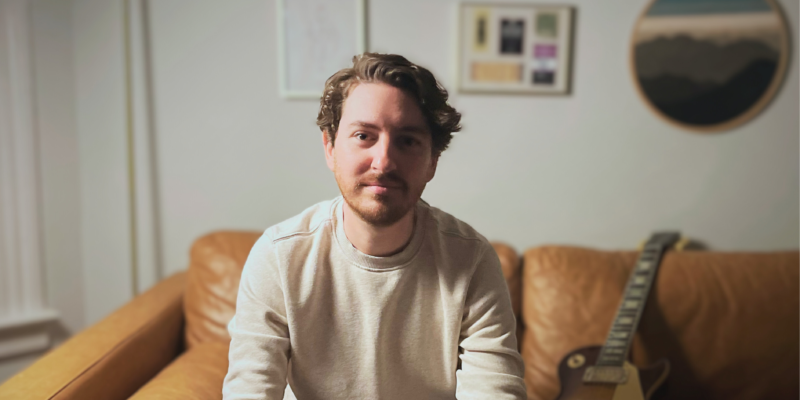Prior to the launch of his new anthemic self-titled EP, we caught up with New Jersey songwriter and musician Sleepwalker, to find out more about the music and his journey to this point. Here’s the conversation in full.
* * *
Hi Kevin – great to catch up with you, huge congrats for the new project. To introduce things, where are you based, and how long was this latest EP in the making?
Thanks for having me! I’m based in Cranford, New Jersey – it’s a great little suburb outside of New York City.
The EP was technically more than 10 years in the making (!) considering that I wrote the bones of the lead single, When the Lights Go Down, a lifetime ago. But the project began in earnest a couple of years ago at the tail end of the pandemic. I set out to record demos of new tunes intent on jumpstarting my band, Kevin Harrison & True North. But the songs had such a different vibe that they transformed into their own thing – Sleepwalker.
Beautiful project, great songwriting and a powerful sound with plenty of anthems at play. How did you come to connect the songs within this latest EP?
Thank you! Wake Me Up was the first song I worked up, and it set the blueprint for the rest of the EP, both musically and lyrically.
The heavy synth, echo-drenched vocals, loose song structure – those were all elements I hadn’t played with before, and using them inspired the song Sleepwalker, which inspired the next, and so on…
Tell me about the writing process for When the Lights Go Down – what came first, and what does this track represent for you?
The song was born more than ten years ago as a straight-ahead rock song that never found a home in my previous albums – or many set lists. It was cool, but lacked any dynamics or groove.
After writing Wake Me Up and Sleepwalker, the idea of reworking Lights came to mind. The lyrical vibe was a perfect fit, but the music was… not.
So, I challenged myself to produce a version entirely devoid of guitars. That let the synth drive the song and put it comfortably into the Sleepwalker vibe. The guitars came back eventually, but as texture instead of the primary character.
Because of the process, When the Lights Go Down shows me the power of production and experimentation. I took a lifeless song and turned it into the lead single on this EP – that’s pretty awesome.
For Delirium we enter a totally new groove and arena-style vastness, whereas for Sleepwalker the pace is mellow, the production atmospheric. How do you decide which direction to take a new track in, and how much freedom do you allow yourself in terms of genre and style?
I’ve always been drawn to albums with a broad dynamic range, as long as they feel cohesive. So while the songs on the Sleepwalker EP vary in pace and intensity, I found – and hope listeners feel the same – that there was something in each track that binds them together.
I gave myself pretty much full freedom to go in whatever direction the music took me, but a big part of the fun was finding those common threads.
Take Burn for example. It’s probably the most straightforward rock song of the bunch, but there’s a space and subtle synth undercurrent that makes it feel like a Sleepwalker track.
You were formerly a live performer with various bands – what does writing and creating as a solo artist bring out in your style that’s different to working with a group, and were there any unexpected difficulties when taking this new path?
To me, they are two completely different – and equally fulfilling – ventures.
You can’t beat the inspiration that comes from playing with incredible musicians with varying backgrounds and interests.
The solo approach lets me say exactly what I want to say, exactly how I want to say it – that brings incredible flexibility and constant learning opportunities, but it also comes with limitations.
I’m nowhere near as capable on drums, bass, keys, or lead guitar as my previous bandmates. So, in doing this all myself I’m sacrificing a good bit of technical proficiency in favor of being able to say, “This is the most authentic musical expression of me at this point in time.”
How will the live shows work as Sleepwalker, and where can fans catch you on stage this summer?
I conceived of Sleepwalker as a studio project, imagining that if I wanted to scratch the live performance itch I’d hook up with my Kevin Harrison & True North buddies.
But, some of these songs would be really fun to play live! I’m not interested in getting up on stage with a laptop full of backing tracks, so I’ll have to put a Sleepwalker band together at some point.
For now, the studio fun is taking priority, and I’m already working up the next batch of Sleepwalker music.
What’s the best way people can support you, and what’s your current biggest ambition in terms of the next six months?
First and foremost, I hope you’ll check out the album – and, if you like what you hear, share it with friends!
And if you want to stay in the loop on what’s coming next, you can give @sleepwalkersounds a follow on Instagram or sign up for my email list.
As for ambitions, I’ve put my rockstar dreams to bed and am focusing on creating music that interests me. I’ve learned that I have very little control over what happens with the music after I put it out into the world, so I remind myself every day to enjoy the creative process rather than wait to enjoy the result.
* * *
Find Sleepwalker on Facebook, TikTok, Instagram & their Website.

